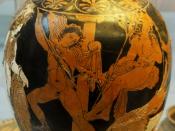Nicole Fantauzzo
1st Hour
English 12
October 8, 2014
Fate or Free Will?
Is it fate that controls the lives of everyday people, or is it their actions that control their lives? In Sophocles'Oedipus the King, the themes of fate and free will are very important throughout the play. Only one however brought about Oedipus' downfall and death. Both points could be argued to great effect. In ancient Greece, fate was considered to be a rudimentary part of daily life. Every aspect of life depended and was based upon fate. It is common belief to assume that mankind does indeed have free will and each individual can decide the outcome of his or her own life. Both the concept of fate and free will determine the destiny of Oedipus the King.
The Greeks believed in the idea that personality of the individual greatly affected his or her own free will.
A person's personality is what decides their own free will. A wise man will make good decisions in his life; an ignorant and stubborn man won't be so fortunate. A characters trait can have a certain positive or negative affect on the choices that they make. For Oedipus, one was the desire for knowledge and truth about his existence. This driving force led to the truth of his existence. These tie in with the aspect of free will; his free will that is based on his drive for knowledge.
For instance where choices linked Oedipus to the prophecy was at the crossroads, it was his fate that led him there. . "Short work, by god-with one blow of the staff" (Sophocles 189). This quote reveals that the gods played a part in the events that took place. Oedipus' prophecy was to kill his own father. Oedipus demonstrates...


